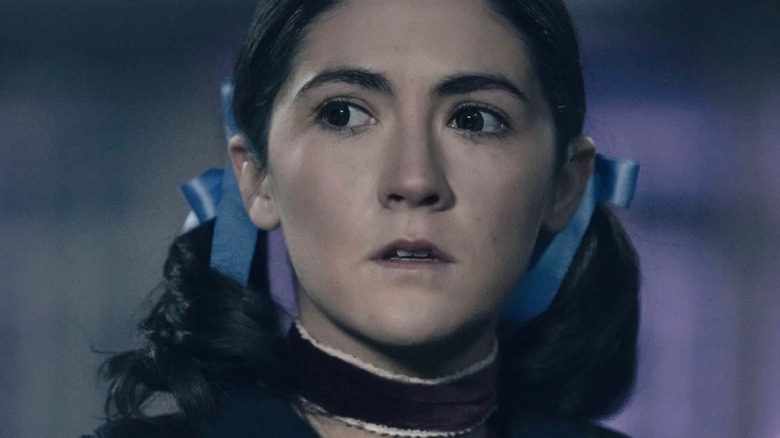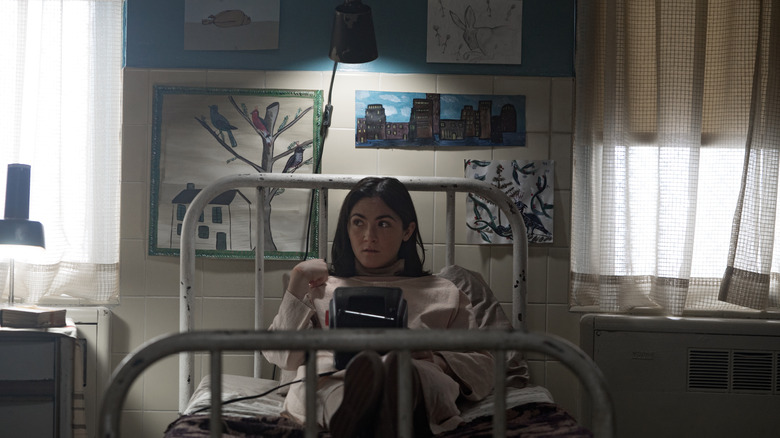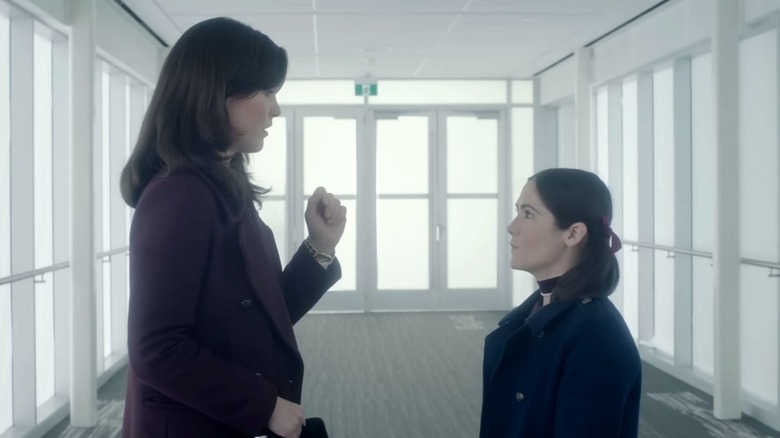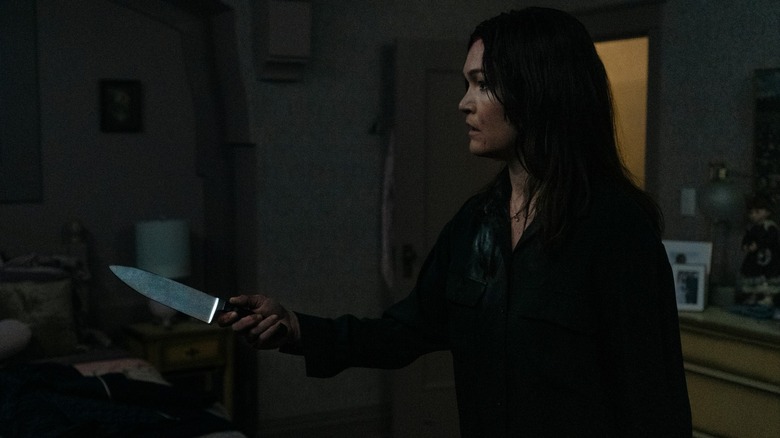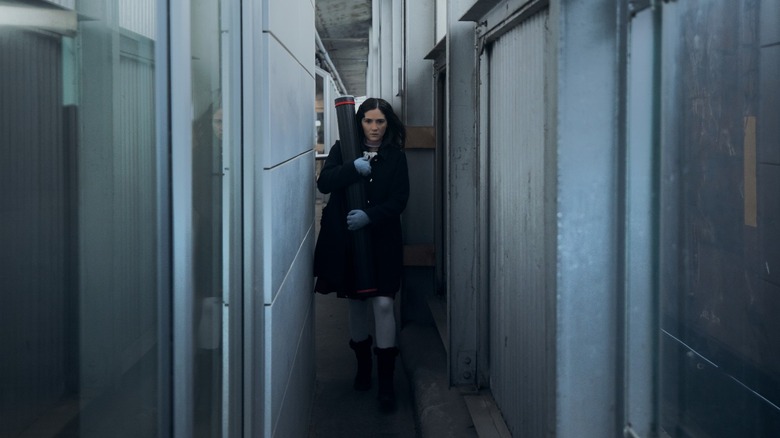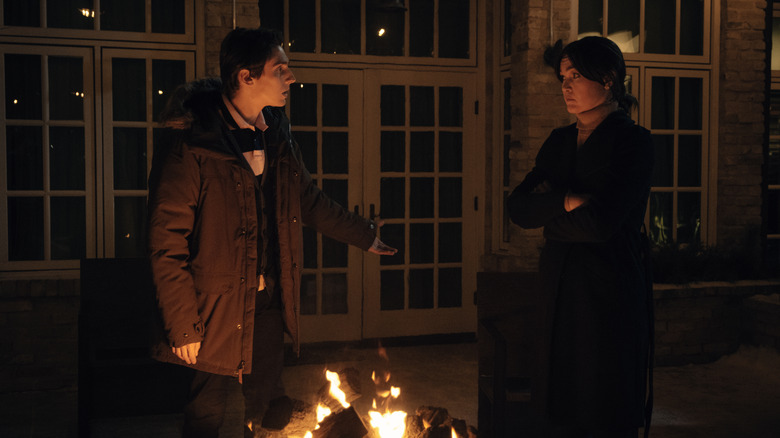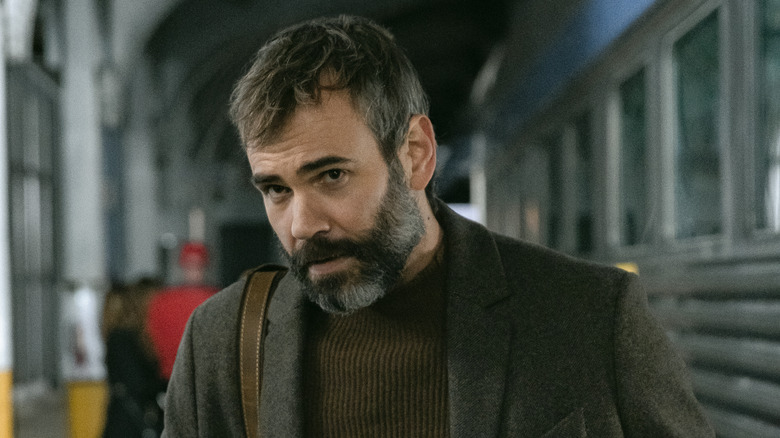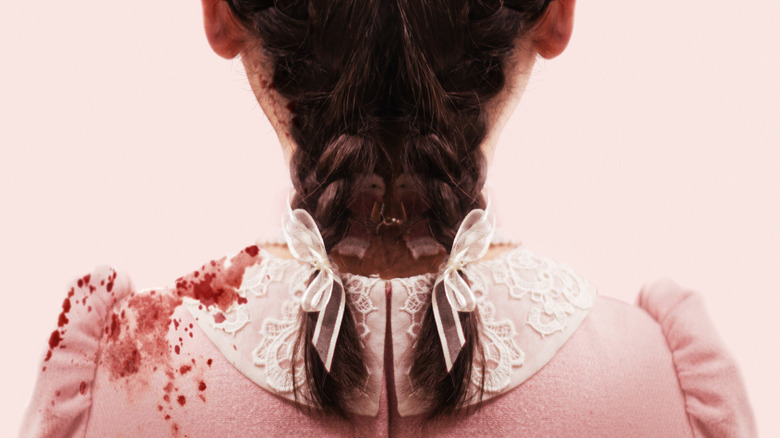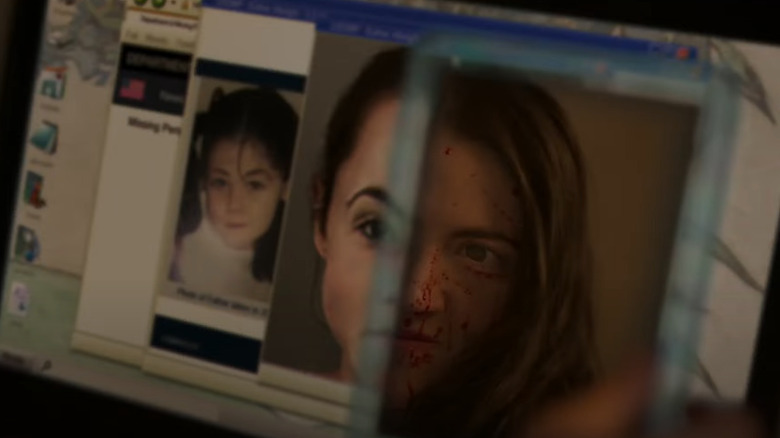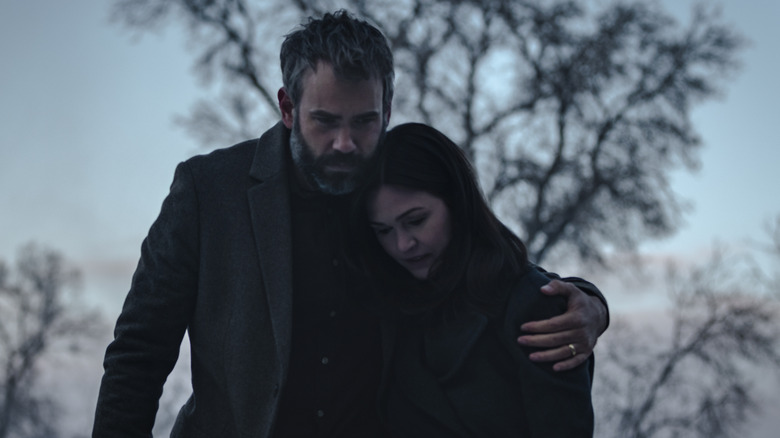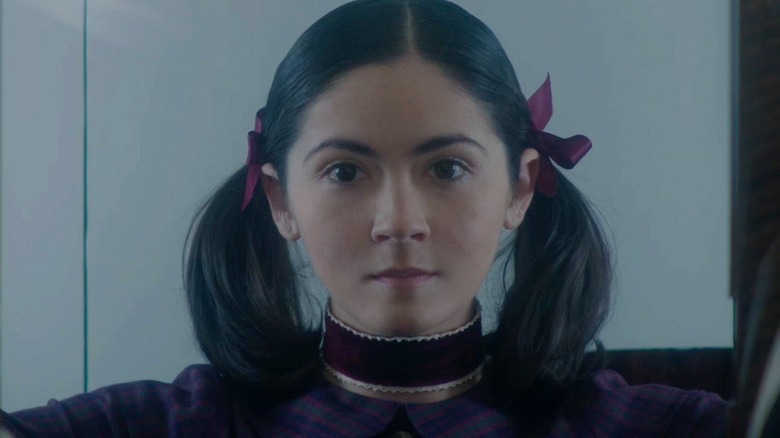The 10 Most Brutal Moments In Orphan: First Kill, Ranked
Warning: The below article contains major spoilers for "Orphan: First Kill."
Lately, horror films have embraced the power of prequels, with 2022 seeing the release of highly anticipated — and critically praised — titles like "Prey" and Ti West's "Pearl." On August 19, "Orphan: First Kill" joined their bloody ranks. These films accomplish what even a great sequel never could, giving long-dead characters a second chance without altering timelines or established storylines. For example, while Esther (played in both movies by Isabelle Fuhrman) died in the original "Orphan," "First Kill" proves that her homicidal past is just as intriguing as her final adventure.
Directed by William Brent Bell ("The Boy"), "Orphan: First Kill" tells Esther's origin story, showing where her scheme to kill unsuspecting mothers and sleep with their husbands began. After escaping a sanitarium, Esther pretends to be the missing child of Tricia (Julia Stiles) and Allen (Rossif Sutherland). However, Esther has targeted the one family ready to fight against her campaign of manipulation and murder. What comes next is a stabby, campy, and darkly funny film that's willing to lean into the brutality of psychological warfare as much as bloodshed. Accordingly, these are the film's most grueling moments, ranked worst to best.
Esther conditions a patient to behave like an attack dog
When we first meet Esther at the Saarne Institute, she's going by her real name: Leena Klammer. As Dr. Novotny (David Lawrence Brown) informs the institute's new art therapist, Anna (Gwendolyn Collins), Leena lived a hard life before she came to the Estonian sanitarium, doing whatever she needed to in order to live. However, he quickly adds that Leena is at the institution because she conned her way into a family and then slaughtered them. During one of Anna's classes, Leena slyly calls out to a fellow patient, Ica (Kristen Sawatzky), sending her into an animal-like state in exchange for a bite of candy. Once Leena throws the sweet at her, Ica calms down. That's when Leena smiles, enjoying the power she has.
Although we never see Leena training Ica, this scene heavily implies that, off-camera, Leena conditioned an older woman with a mental illness to be her bodyguard. Ica brutally attacks orderlies for Leena, and her compliance overrides any sense of self-preservation, showing how chillingly persuasive Leena can be. She only cares about her own survival, and this moment gives us a hint as to the darker choices she'll make a little bit later.
If you or someone you know needs help with mental health, please contact the Crisis Text Line by texting HOME to 741741, call the National Alliance on Mental Illness helpline at 1-800-950-NAMI (6264), or visit the National Institute of Mental Health website.
Esther's smoothie recipe
Once the film reveals its central plot twist, "Orphan: First Kill" embraces its campy vibes and crafts a compelling game of chicken between Tricia and Esther. Julia Stiles told Entertainment Weekly that the film's second act reveal is the "reason [she] wanted to be in the movie." Overall, it works fantastically well, upping the ante for the prequel while showing off just how terrifying Stiles can be in a villainous role.
After Tricia tells Esther that she has to live with the family she joined via trickery, Esther finds unnerving ways to taunt her new mom. The grossest, and the one most appropriate for a budding serial killer, comes when Esther puts a dead rat in Tricia's green smoothie. Of course, Tricia takes a sip from the drink before she realizes that a dead animal is at the bottom of her glass. (Gross!)
Although rats might make some squeamish, the little animal didn't deserve to be used as a prop in Esther's twisted games. Esther's cruelty further highlights how little regard she has for all living things, even cute, fuzzy, and unsuspecting animals. For Esther, any creature is a fair target. Esther does what she does because of the power it gives her, and her malicious nature only grows stronger as the film continues.
Tricia co-murders a detective
"Orphan: First Kill" could have revealed Tricia's secret motive — she's caring for a random child to hide the fact that her son murdered her daughter — in several ways. Thankfully, while this twist could have become a convoluted plot point, David Coggeshall's screenplay deftly handles the disclosure of Tricia's sinister side.
As Esther brutally stabs Detective Donnan (Hiro Kanagawa), Tricia appears and shoots the man multiple times in the chest. The detective was already close to death before Tricia's arrival; however, the gunshots immediately tell us that there's much more to Tricia than we initially thought. Her actions are really a bloody power move, and it feels like Tricia is proving to Esther that she's just as cutthroat as the girl. This scene establishes that Tricia is an unrelenting figure who wants to control every situation.
However, Tricia's bloody potential slows down after this story beat. The bloodshed stops, leading into a confessional-style montage about Tricia's motivations. Although this scene earns a spot on this list for its shock value, Tricia's violent nature doesn't take center stage just yet. Hold on; that's coming.
Esther's train-based murder plot
Early in the film, it's clear that Esther is crushing on her new daddy, Allen. For viewers who saw Jaume Collet-Serra's "Orphan," that's a huge red flag. Esther clearly believes that she and Allen are fated to be together, but she has to kill off the rest of his family in order for their romance to blossom.
Appropriately, one of Esther's earliest schemes in "Orphan: First Kill" is to use a painting of her "father" to push Tricia and Gunnar into the path of a moving train. Although someone pulls her back, thinking she innocently fell forward, this still reveals an alarming truth about Esther: She isn't as calculating as she thinks she is, and she'd rather murder people in broad daylight than find a clever way to cover up her crimes. That is terrifying.
Of course, the murders that Esther has and will commit end up overshining this moment in a big way. Nevertheless, this scene shows how confidently Esther uses her childlike persona as a weapon. Those around her may not actually believe that she "accidentally" pushed her family onto the train tracks, but Esther acts as if that presumption of innocence is guaranteed.
Esther kills Gunnar with his own crossbow
Oh, Gunnar. While "Orphan: First Kill" initially encourages the viewer to sympathize with the murderous Tricia, Gunnar (Matthew Finlan) is a bit of a joke. When Esther first comes home, he's rude to her, his friends are horrible, and he's obsessed with his crossbow. That last tidbit is particularly suspect; why does a teen who lives in a suburban mansion need hunting gear, anyway? Everything that we learn about Gunnar makes us dislike him, so we believe it when we discover that he killed his real sister. As such, when he pleads with Tricia for permission to kill Esther in order to solve their problems, it's such a wild thought that it's hysterical. Like his mother, he's entitled, and this makes us root for his inevitable death.
Gunnar shows no remorse for killing his sister, and while we don't know how Gunnar "played too rough" with her, my hunch is that the crossbow played a major role. Regardless, Gunnar still sees the weapon as a source of power, and having Esther turn it around on him is deliciously brutal. Esther shoots him in the heart and stabs him in the back repeatedly. Metaphorically, this feels like a way to acknowledge Gunnar's betrayal. Overall, it's a fun moment, but it would have landed harder if we had a stronger emotional connection with Gunnar. As it is, his death doesn't have quite as much meaning as Anna's or Tricia's.
If you or someone you know may be the victim of child abuse, please contact the Childhelp National Child Abuse Hotline at 1-800-4-A-Child (1-800-422-4453) or contact their live chat services.
Allen rejects Esther
While Allen's rejection of Esther occurs right at the climax of "Orphan: First Kill," it doesn't land with the same brutality as the rest of the film's bloody mayhem. Like Gunnar, Allen is around for much of the film's action, but he's not really a part of it. William Brent Bell's film is about Tricia and Esther and their competition with each other. Everyone else is just a bit player.
Despite posing as his daughter, Esther believes that she can seduce Allen. As such, Tricia taunts Esther by telling them how often they have sex now that their "daughter" is home. Unlike the Esther that we saw in "Orphan," this iteration of the character relies on her supposed innocence to charm Allen. She doesn't flirt with him "Lolita"-style or drug him, as she does later to John Coleman (Peter Sarsgaard). Narratively, that works well. It makes sense that, after what happens with Allen, Esther would switch up her seduction routine.
Throughout the film, Allen is excited to bond with his daughter, but (thankfully) there's never a point at which he sexualizes her. When Esther's false teeth fall out, he's straight-up disgusted, causing Esther to push him off a roof. For all the pointed conversations around him, Allen never senses that something is off with his wife and "daughter." Watching him die without ever learning truth about his real daughter's murder is a gut punch. However, while Allen's death hits harder than Gunnar's, his obtuseness makes his murder both expected and somewhat bland.
Tricia and Esther's kitchen battle
Sure, it's delightful to see how callous Julia Stiles' Tricia is to Esther throughout "Orphan: First Kill." With one exception, though, their banter pales in comparison to the film's kitchen battle. By the film's final act, Tricia has had enough of Esther, and she decides it's time to kill her "child." But Esther refuses to go down without a fight. Tricia knocks Esther's fake teeth out of her mouth; Esther replies by smashing a white porcelain bowl on Tricia's head. No one is holding back.
At first, it seems like Tricia will win the brawl — or, at least, live through it. Esther has survived so long because she uses the element of surprise — and her 30-something-year-old brainpower — to outwit others, but Tricia knows about the con from the get-go. As a result, her guard is always up. That scares Esther, particularly during this fight, and it's easy for the audience to doubt the extent of Esther's power. Watching a predator realize that she has to up her game to take out another murderer is absolutely thrilling.
Anna's tragic death
Based on how much time the opening of "Orphan: First Kill" spends on Anna, I thought that she'd have a larger part in the film. Fittingly, however, she's the film's first kill — and one of its most brutal ones. As the newbie at the Saarne Institute, Anna reintroduces the world to Esther. As Anna learns about Esther's origins, so do we. From her vantage point, we gain insights into what Esther was like at the sanitarium, as well as a creeping sense of dread. Anna is empathetic and highly cautious, and we want her to survive. Also, unlike most of the characters in Esther's world, she's clever enough to know when to get away. She meets Esther on her first day of work, and soon decides to quit her job. Good for you, Anna!
Anna escapes while Esther is on a murderous rampage; Esther even waves to her as Anna's leaving the sanitarium, seemingly showing mercy for the therapist, who only wants to help people through art. But then Esther surprises Anna at home and bashes her head in. By hunting Anna, Esther risks being caught by the local authorities, and yet she can't resist killing a woman who she views as a potential threat. Although Anna is, in the end, a minor character, her death feels more brutal because of how unfair it is.
Tricia's plan to kill Esther
The harshest line in "Orphan: First Kill" comes when Tricia says, "Your suicide is going to break Daddy's heart ... but he'll get over it." Geez! I don't think I've heard a line that brutal in years. Although Tricia doesn't make it out of the film alive, it's still harrowing to see how casually cool she is about killing another daughter and lying about it (okay, technically, she didn't kill her first daughter, but she had no problem making it look like a missing person's case in order to protect her son, causing her husband to grieve for years).
Earlier in the film, Tricia even plants the seeds of the idea that Esther might be having suicidal thoughts. While this doesn't lead to direct violence, the scheme suggests how detached and cold Tricia is. If that kind of plan comes to her this easily, it's worth asking what other misdeeds she has committed in the past. Sometimes, imagining what else a character is capable of is scarier than seeing events unfold on screen, and Tricia's lack of empathy is chilling, implying that, for her, murder is a valid solution to many of life's problems.
If you or anyone you know is having suicidal thoughts, please call the National Suicide Prevention Lifeline by dialing 988 or by calling 1-800-273-TALK (8255).
Allen chooses Esther over his wife
Hands down, the cruelest moment in this film is when Allen chooses to save Esther's life over Tricia's. At this time, he has no idea who Esther is. Their house is on fire, and his wife and "daughter" cling onto a roof for survival. Tricia tries to tell Allen that Esther is lying. In her dying moments, Tricia is screaming at Allen for help. However, he's not listening to her.
Maybe the pain of losing his daughter once was too much. Maybe Allen couldn't bare to lose another daughter — whoever she is — again. Or perhaps Tricia bent truth so much in their marriage that Allen is reticent to trust her. Regardless of his reasoning, he grabs Esther's hand. Moments later, Tricia falls to her death. You can hear the crunch when she lands, and the shot lingers on her body. Julia Stiles played such a good villain that I found myself screaming at the screen. Even if she was horrible, couldn't we see her be horrible more?
Thankfully, Allen's poor life decisions doom his fate to make up for a Tricia-less world. All of the "Orphan" films play with the theme of what trust means in a family and how those dynamics can unintentionally lead to disastrous consequences. Secrets, lies, and omissions create the perfect environment for Esther to sow division and win. Here, she does it swiftly and brutally. Allen died without knowing what or who hit him.
